Guest blogged by Ernest A. Canning
 Election laws in Wisconsin are not covered by Section 5 of the federal Voting Rights Act, which would otherwise require the Dept. of Justice or a federal panel of judges to "preclear" such laws to assure they are not discriminatory. Thus, it falls to non-governmental organizations, such as the American Civil Liberties Union (ACLU), to take legal action in hopes of protecting Constitutional voting rights for citizens of the Badger State.
Election laws in Wisconsin are not covered by Section 5 of the federal Voting Rights Act, which would otherwise require the Dept. of Justice or a federal panel of judges to "preclear" such laws to assure they are not discriminatory. Thus, it falls to non-governmental organizations, such as the American Civil Liberties Union (ACLU), to take legal action in hopes of protecting Constitutional voting rights for citizens of the Badger State.
That's exactly what the organization did this week, in filing a 54-page federal complaint on behalf of some 17 named plaintiffs --- including elderly, student, minority and even veteran voters --- who may well be unable to cast their once-legal vote under the state's new voter suppression bill passed earlier this year by its GOP legislature and signed into law by its Republican Gov. Scott Walker.
The lead plaintiff in Frank vs. Walker [PDF], the ACLU's class action lawsuit filed in the U.S. District Court for the Eastern District, seeking to halt enforcement of the state's new photo ID voting restrictions, is 84-year old Ruthelle Frank.
As we previously reported, Frank has been a lawful resident of Brokaw, WI since her home birth in 1927. Although she has voted in every election since 1948 and is an elected member of the Brokaw Village Board, she learned that she may be barred from voting come February 2012 because she lacks one of the official photo IDs mandated by that state's new vote-suppressing photo ID law.
She was born at home, without a birth certificate, and will be forced to pay $20 to get one in order to get her supposedly "free" ID to vote. But even that may not be enough. Frank recently learned she may not be able to comply with the state GOP's Photo ID restriction unless she coughs up upwards of $200 to amend the Register of Deeds record of her home, which had misspelled her maiden name.
The feisty octogenarian, however, was not about to quietly accept this assault on a right she had exercised without interference for the past 63 years (see a video interview with her below), and so she agreed to lead the ACLU suit.
The ACLU complaint, however, may serve to be larger than just the 17 voters (and thousands of others included as part of 6 different classes) in the state of Wisconsin. If it succeeds, the lawsuit could have national implications that would go well beyond the question of who gets to vote in Wisconsin in the 2012 Presidential election. The case could serve to reverse the bevy of voter-suppression laws being enacted by Republicans in state after state in the wake of their take-over of statehouses across the nation in November of 2010...
Significance of 'as applied' challenge to WI photo ID law
The new draconian photo ID restrictions now in place across the country were all passed in the wake of Indiana's photo ID law which, in 2008, was the first to be granted approval by the U.S. Supreme Court.
In the Indiana case, Crawford vs. Marion County Board of Elections, the plaintiffs alleged that the state photo ID law was unconstitutional "on its face." The decision to challenge its constitutionality solely on the face of the statute alone proved fatal. The Supreme Court's lead opinion in Crawford, written by Justice John Paul Stevens and joined by Chief Justice John Paul Roberts and Justice Anthony Kennedy, observed that the plaintiffs had "not introduced evidence of a single, individual Indiana resident who will be unable to vote as a result of [the photo ID statute] or who will have his or her right to vote unduly burdened by its requirements."
In the newly-filed Wisconsin case, however, the ACLU, using representative plaintiffs, has challenged the constitutionality of the state's photo ID law "as applied" to six categories of WI residents who lack the requisite form of photo ID mandated by the statute. The complaint alleges that these WI residents face a severe, and at times, impossible burden --- burdens which the lead opinion in Crawford suggests might have produced a different result in that case.
The ACLU's new challenge to the WI photo ID law not only offers the evidence of undue burden that was missing in the Crawford case as presented, but reveals fundamental distinctions between the ineffective factual record presented to the Supreme Court in that case, along with a powerful factual record that can be presented in Frank v. Walker.
According to the ACLU complaint, the WI photo ID statute is broader than the photo ID law at issue in Crawford. The Indiana law applied only to in-person voting, where the WI statute applies to absentee voting as well.
The District Court in Crawford found that 99% of IN voters already possessed the requisite ID.
By contrast, a study by the Univ. of Wisconsin-Madison revealed that more than 177,000 WI residents over the age of 65 do not possess a driver's license; that 70% of that number are women.
The study revealed that low income individuals in WI, especially people of color, are disproportionately affected:
IN has full time DMVs in every county, with some 124 offices open on weekends, allowing for much easier access to receive the "free" IDs made available by the law. In WI, there are three counties which have no DMV at all. More than one-half of Wisconsin's 91 DMVs are open only on a part-time basis; 26% for only one day per month, or less. Only one WI DMV is open on weekends at all.
Thus, the ACLU lawsuit presents voters who may well be disenfranchised by the new law, along with the very item of evidence that the Crawford plaintiffs failed to produce --- evidence of an undue burden upon the right to vote. That evidence, had it been included in the IN case, might have stopped the nationwide spate of GOP photo ID laws in their tracks.
While not expressly mentioned in their complaint, it is anticipated that the ACLU will seek a preliminary injunction in order to prevent the WI photo ID law from being enforced in February 2012. It they succeed, it will no doubt trigger an appeal, at which point the critical question will be whether the appellate court would issue a stay, given that voters could be irreparably harmed if the photo ID statute were permitted to go into immediate effect.
Alleged violations of 14th & 24th Amendments
Class 1, as described in the ACLU complaint, a class which includes Ruthelle Frank, are residents who are "unable for legal and/or practical reasons to obtain one or more of the primary, underlying documents [e.g., a birth certificate] required to obtain a Wisconsin ID card for voting purposes."
The complaint alleges that, for this class, the WI Photo ID statute imposes an as-applied denial of the right to Equal Protection as guaranteed by the 14th Amendment to the U.S. Constitution.
Class 2 entails "voters...for whom the cost in obtaining the state ID, accurate copy of a birth certificate and to travel to the nearest WI DMV would constitute a severe financial burden." Similarly, Class 5 entails voters who must pay one or more fees to obtain a birth certificate.
Citing statistics --- such as the 357,912 WI residents between the ages of 18 and 64 and 57,900 ages 65 and older who have incomes below the federal poverty level --- the ACLU complaint not only alleges a violation of their right to Equal Protection under the 14th Amendment but that the WI photo ID law violates the 24th Amendment as an unconstitutional poll tax.
As revealed by the lead opinion in Crawford, the poll tax issue, expressly held unconstitutional in Harper vs. Virginia Bd. of Elections (1966), especially in the context of the disproportionate number of African American and Hispanic voters, could potentially subject the WI photo ID law to strict scrutiny, under which it could not be upheld absent a showing that it was narrowly tailored to serve a compelling governmental interest.
Class 3 are college and university students who are forced to choose between retaining their out-of state driver's licenses and voting in the state of Wisconsin. Class 4 encompasses students at WI technical colleges whose student photo IDs are not accepted under the new WI statute.
This aspect of the WI photo ID law is strikingly similar to the efforts by Maine's clueless GOP Chair Charlie Webster and by its Republican Secretary of State Charles E. Summers to harass out-of-state college students who seek to exercise their right to treat their dorms as their residence for voting purposes --- a right confirmed by the U.S. Supreme Court in its 1979 ruling in a Symm vs. United States.
As we previously noted in covering the shameful efforts of Webster and Summers in Maine:
The ACLU complaint alleges that this aspect of the WI photo ID statute violates the Equal Protection clause of the 14th Amendment.
Class 6 entails U.S. military veterans who possess a Veteran's ID card issued by the U.S. Department of Veterans Affairs but lack the requisite WI photo ID.
One of the representative plaintiffs, Carl Ellis, 52, falls within both Class 2 and Class 6. He is a U.S. Army veteran who resides in a homeless shelter in Milwaukee. Ellis is quoted by the ACLU as saying, "If I can serve my country, I should be able to vote for who runs it."
Absence of compelling governmental interest
The 54-page ACLU complaint alleges, at various points, either that there is a lack of a compelling governmental interest or even a rational basis for the photo ID law.
As forcefully demonstrated by Loyola Law Professor Justin Levitt during the recent U.S. Subcommittee Hearings on the new GOP voter suppression laws, photo ID restrictions are not only a solution in search of a problem, but a "solution" that is so ill-fitted to the grossly overstated problem as to be equated to amputating one's foot in order to cure a "potential" hangnail.
There is only one form of "voter fraud" which can be addressed by photo ID laws restricting the right to vote at the polls --- the incredibly rare case of in-person impersonation.
Levitt's 2007 "The Truth About Voter Fraud," a study published by the non-partisan Brennan Center for Justice at NYU Law School, "found that 'voter fraud is extraordinarily rare' but did not find a single incidence of voter impersonation." That, the study argues, is for an obvious reason. That type of fraud is incredibly difficult, fraught with risk, and all for the possible gain of one single vote:
In his written testimony, Levitt revealed that, since 2000, there were "nine allegations of votes [in general elections] that might have involved votes cast by individuals impersonating others," but those nine may be the result of "poll worker error or voter confusion...During the same period, 400 million votes were cast...Even assuming that each of the nine votes were fraudulent, that amounts to a relevant fraud rate of 0.000002 percent. Americans are struck and killed by lightning more often."
That, even as study after study has shown that millions of legal voters, nationwide, stand to lose their right to vote for lack of a state-issued and approved Photo ID.
Photo ID part of oligarchic class warfare
During the U.S. Senate Subcommittee hearings, the coordinated, nationwide GOP voter suppression effort was aptly described by Judith Browne Dianis, a civil rights litigator at The Advancement Project, and a witness in the second three-member panel, as "the largest legislative effort to roll back voting rights since the post-Reconstruction era."
Dianis further charged during her testimony that, "collectively," the new assault on voting rights reflects a coordinated effort at "voter suppression, making it harder to register to vote, harder to cast a ballot and harder to have a vote counted."
Neither is it by accident or coincidence.
The fact that Paul Weyrich was a co-founder of the American Legislative Exchange Counsel (ALEC) , the billionaire-funded organization that has drafted the models for these voter-suppression laws, is significant.
"I don't want everybody to vote," Weyrich extolled while addressing a right-wing Christian audience in 1980 (see haunting video at right). "[O]ur leverage in the elections goes up as the voting populace goes down," he added after denigrating those who seek "good government" through maximum, informed voter participation as people who suffer from the "goo goo syndrome."
It is also not an accident that the same rapacious billionaires, like the Koch Brothers, who have funded these democracy destroying, voter suppression measures (see video below), are also behind the drive to destroy public employee unions.
When Charles Koch described the upcoming 2012 election as the "Mother of All Wars," he wasn't just referring to the effort to defeat President Obama. He was giving voice to the reality that he and his fellow oligarchs are now fully at war with democracy itself.
For the self-proclaimed libertarian Koch brothers, it is not enough that their combined net worth increased from $34 billion to $50 billion during the Obama administration. As we noted recently in "Occupy Electoral Politics!", quoting former New York Times journalist Chris Hedges, the Koch brothers are part of a class of rapacious oligarchs, whose radical goal is not merely the ability to carry out their pillage of the economy and the environment with impunity, but the decimation of "all impediments to the creation of a neo-feudalistic corporate state."
In challenging the constitutionality of the WI photo ID law, the ACLU federal lawsuit, along with a previous lawsuit filed by the League of Women Voters against the same statute in state court, has placed the oligarchs on notice. We the people are not prepared to surrender our democracy.
ACLU video on Frank v. Walker follows...
Short video explaining role played by the Koch brothers and ALEC in spate of GOP voter suppression laws...
Video depicting how WI GOP jammed through its Photo ID law in minutes. No, the guy in the sunglasses, banging the gavel and running the vote is not a Mafia don. He's WI GOP Senate President Mike Ellis...
Ernest A. Canning has been an active member of the California state bar since 1977. Mr. Canning has received both undergraduate and graduate degrees in political science as well as a juris doctor. He is also a Vietnam vet (4th Infantry, Central Highlands 1968). Follow him on Twitter: @Cann4ing.


 'Green News Report' 1/15/26
'Green News Report' 1/15/26
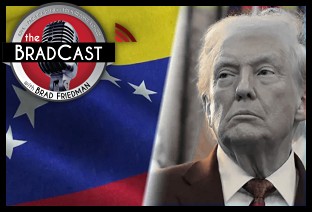 'This Isn't Close to Over': Mad King Trump in Venezuela (and Beyond): 'BradCast' 1/14/26
'This Isn't Close to Over': Mad King Trump in Venezuela (and Beyond): 'BradCast' 1/14/26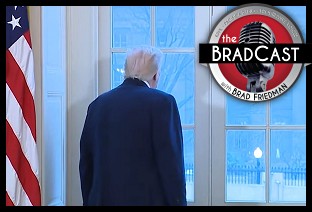 Things Getting Weirder
Things Getting Weirder 'Green News Report' 1/13/26
'Green News Report' 1/13/26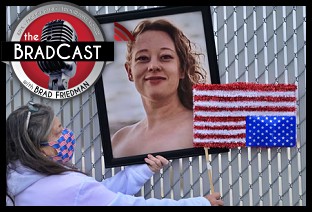 After ICE Murder in MN, Local Cops Disowning Fed Policing Practices: 'BradCast' 1/12/26
After ICE Murder in MN, Local Cops Disowning Fed Policing Practices: 'BradCast' 1/12/26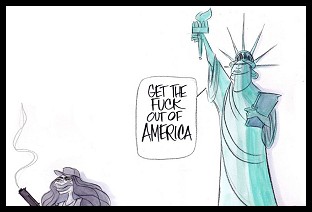 Sunday 'Ice Age' Toons
Sunday 'Ice Age' Toons Trump to Congress, Climate, U.N., Rule of Law, World: DROP DEAD - 'BradCast' 1/8/26
Trump to Congress, Climate, U.N., Rule of Law, World: DROP DEAD - 'BradCast' 1/8/26 'Green News Report' 1/8/26
'Green News Report' 1/8/26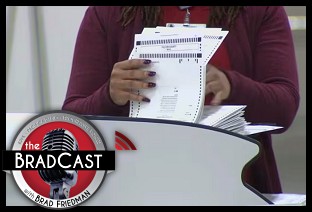 'Nonsense': Trumpers Claim 315k Fraudulent GA Votes in 2020: 'BradCast' 1/7/26
'Nonsense': Trumpers Claim 315k Fraudulent GA Votes in 2020: 'BradCast' 1/7/26 Jack Smith Testimony on Trump J6 Crimes, DOJ Weaponization: 'BradCast' 1/6/26
Jack Smith Testimony on Trump J6 Crimes, DOJ Weaponization: 'BradCast' 1/6/26 'Green News Report' 1/6/26
'Green News Report' 1/6/26 Trump's War on Venezuela is About Ego, Power, Creation of 'Alien Enemies': 'BradCast' 1/5/26
Trump's War on Venezuela is About Ego, Power, Creation of 'Alien Enemies': 'BradCast' 1/5/26 Sunday 'Peace President' Toons
Sunday 'Peace President' Toons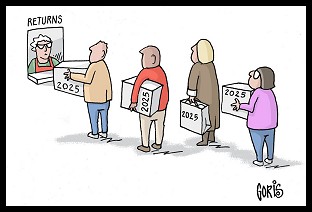 Sunday 'Many Happy Returns' Toons
Sunday 'Many Happy Returns' Toons Have a Holly Jolly Somehow
Have a Holly Jolly Somehow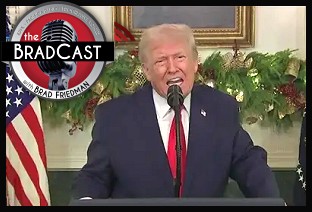 Old Man Shouts at People from WH for 20 Minutes: 'BradCast' 12/18/25
Old Man Shouts at People from WH for 20 Minutes: 'BradCast' 12/18/25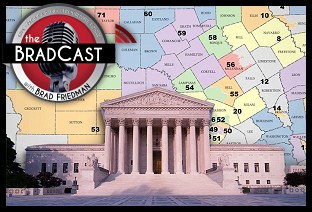 SCOTUS' How-To on Gerrymandering on 'Eve' of Election Year: BradCast' 12/17/25
SCOTUS' How-To on Gerrymandering on 'Eve' of Election Year: BradCast' 12/17/25 Bricks in the Wall: 'BradCast' 12/16/25
Bricks in the Wall: 'BradCast' 12/16/25 'This One Goes to 11': Weekend of Violence, Murder of Rob Reiner: 'BradCast' 12/15
'This One Goes to 11': Weekend of Violence, Murder of Rob Reiner: 'BradCast' 12/15 Trump Now Losing One Battle After Another: 'BradCast' 12/11/25
Trump Now Losing One Battle After Another: 'BradCast' 12/11/25 Dems Continue Stunning 2025 Election Streak: 'BradCast' 12/10/25
Dems Continue Stunning 2025 Election Streak: 'BradCast' 12/10/25 Petrostates and Propa-gandists Undermining Climate Science: 'BradCast' 12/9/25
Petrostates and Propa-gandists Undermining Climate Science: 'BradCast' 12/9/25
 VA GOP VOTER REG FRAUDSTER OFF HOOK
VA GOP VOTER REG FRAUDSTER OFF HOOK Criminal GOP Voter Registration Fraud Probe Expanding in VA
Criminal GOP Voter Registration Fraud Probe Expanding in VA DOJ PROBE SOUGHT AFTER VA ARREST
DOJ PROBE SOUGHT AFTER VA ARREST Arrest in VA: GOP Voter Reg Scandal Widens
Arrest in VA: GOP Voter Reg Scandal Widens ALL TOGETHER: ROVE, SPROUL, KOCHS, RNC
ALL TOGETHER: ROVE, SPROUL, KOCHS, RNC LATimes: RNC's 'Fired' Sproul Working for Repubs in 'as Many as 30 States'
LATimes: RNC's 'Fired' Sproul Working for Repubs in 'as Many as 30 States' 'Fired' Sproul Group 'Cloned', Still Working for Republicans in At Least 10 States
'Fired' Sproul Group 'Cloned', Still Working for Republicans in At Least 10 States FINALLY: FOX ON GOP REG FRAUD SCANDAL
FINALLY: FOX ON GOP REG FRAUD SCANDAL COLORADO FOLLOWS FLORIDA WITH GOP CRIMINAL INVESTIGATION
COLORADO FOLLOWS FLORIDA WITH GOP CRIMINAL INVESTIGATION CRIMINAL PROBE LAUNCHED INTO GOP VOTER REGISTRATION FRAUD SCANDAL IN FL
CRIMINAL PROBE LAUNCHED INTO GOP VOTER REGISTRATION FRAUD SCANDAL IN FL Brad Breaks PA Photo ID & GOP Registration Fraud Scandal News on Hartmann TV
Brad Breaks PA Photo ID & GOP Registration Fraud Scandal News on Hartmann TV  CAUGHT ON TAPE: COORDINATED NATIONWIDE GOP VOTER REG SCAM
CAUGHT ON TAPE: COORDINATED NATIONWIDE GOP VOTER REG SCAM CRIMINAL ELECTION FRAUD COMPLAINT FILED AGAINST GOP 'FRAUD' FIRM
CRIMINAL ELECTION FRAUD COMPLAINT FILED AGAINST GOP 'FRAUD' FIRM RICK SCOTT GETS ROLLED IN GOP REGISTRATION FRAUD SCANDAL
RICK SCOTT GETS ROLLED IN GOP REGISTRATION FRAUD SCANDAL VIDEO: Brad Breaks GOP Reg Fraud Scandal on Hartmann TV
VIDEO: Brad Breaks GOP Reg Fraud Scandal on Hartmann TV RNC FIRES NATIONAL VOTER REGISTRATION FIRM FOR FRAUD
RNC FIRES NATIONAL VOTER REGISTRATION FIRM FOR FRAUD EXCLUSIVE: Intvw w/ FL Official Who First Discovered GOP Reg Fraud
EXCLUSIVE: Intvw w/ FL Official Who First Discovered GOP Reg Fraud GOP REGISTRATION FRAUD FOUND IN FL
GOP REGISTRATION FRAUD FOUND IN FL

































